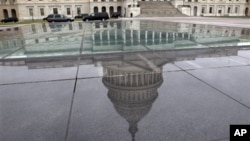The U.S. Senate compromise intended to avert the most immediate consequences of the fiscal cliff is drawing criticism from many parts of the political spectrum.
A public interest group that has been urging Washington to do more to balance its spending and revenue, The Concord Coalition, said the Senate made "no hard choices" and solved "no difficult problems." The group's leader, Robert Bixby, said the deal did not solve the problem of rising costs for pension and medical care programs for the elderly, did not reform the tax system, delayed efforts to cope with scheduled drastic spending cuts, and did not address the need to raise Washington's legal limit on borrowing.
The Campaign for America's Future, called the deal "ugly," and echoed many of Concord's criticisms. The liberal group also said the Senate action would allow a temporary 2 percent cut in payroll taxes to expire. This could add $1,000 to the tax burden paid by someone making $50,000 a year. Some economists say the expiring tax cuts will slow the consumer spending that drives most U.S. economic activity.
Opinion articles in The New York Times called the measure "tepid" and a "fiscal flop" and said the compromise is a missed opportunity to make needed political and economic reforms.
A story in The Wall Street Journal called the deal a "classic compromise" with something for "everyone to love - and hate."
A public interest group that has been urging Washington to do more to balance its spending and revenue, The Concord Coalition, said the Senate made "no hard choices" and solved "no difficult problems." The group's leader, Robert Bixby, said the deal did not solve the problem of rising costs for pension and medical care programs for the elderly, did not reform the tax system, delayed efforts to cope with scheduled drastic spending cuts, and did not address the need to raise Washington's legal limit on borrowing.
The Campaign for America's Future, called the deal "ugly," and echoed many of Concord's criticisms. The liberal group also said the Senate action would allow a temporary 2 percent cut in payroll taxes to expire. This could add $1,000 to the tax burden paid by someone making $50,000 a year. Some economists say the expiring tax cuts will slow the consumer spending that drives most U.S. economic activity.
U.S. Fiscal Deal Facts
U.S. FISCAL DEAL FACTS- Raises $600 billion over 10 years through higher taxes on wealthier Americans
- Delays by two months billions of dollars in mandatory defense and domestic spending cuts
- Extends farm bill provisions to prevent a spike in milk prices
- Blocks cuts to payments for doctors who treat elderly Americans
- Extends unemployment benefits to 2 million people for one year
- Cancels a $900 cost-of-living raise for members of Congress
- Extends child tax credits, and those for college tuition and renewable energy
A story in The Wall Street Journal called the deal a "classic compromise" with something for "everyone to love - and hate."





